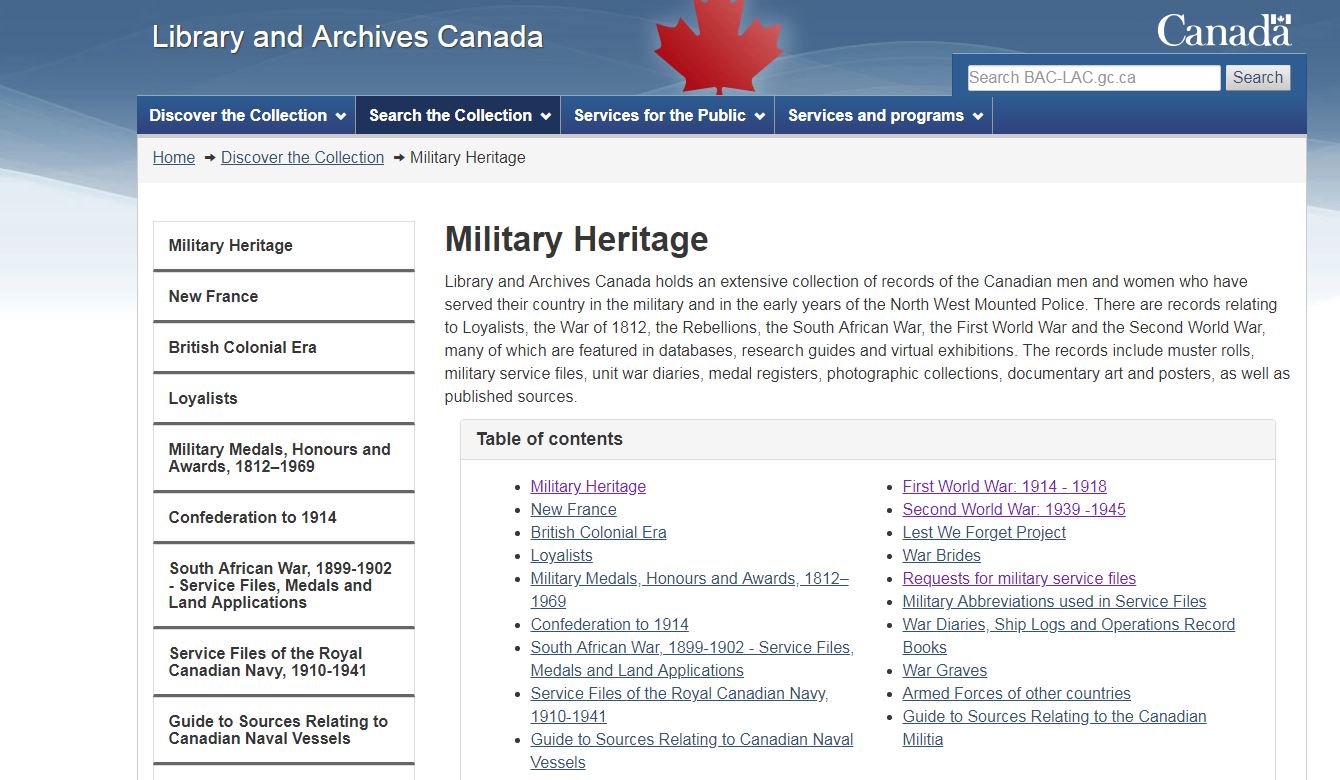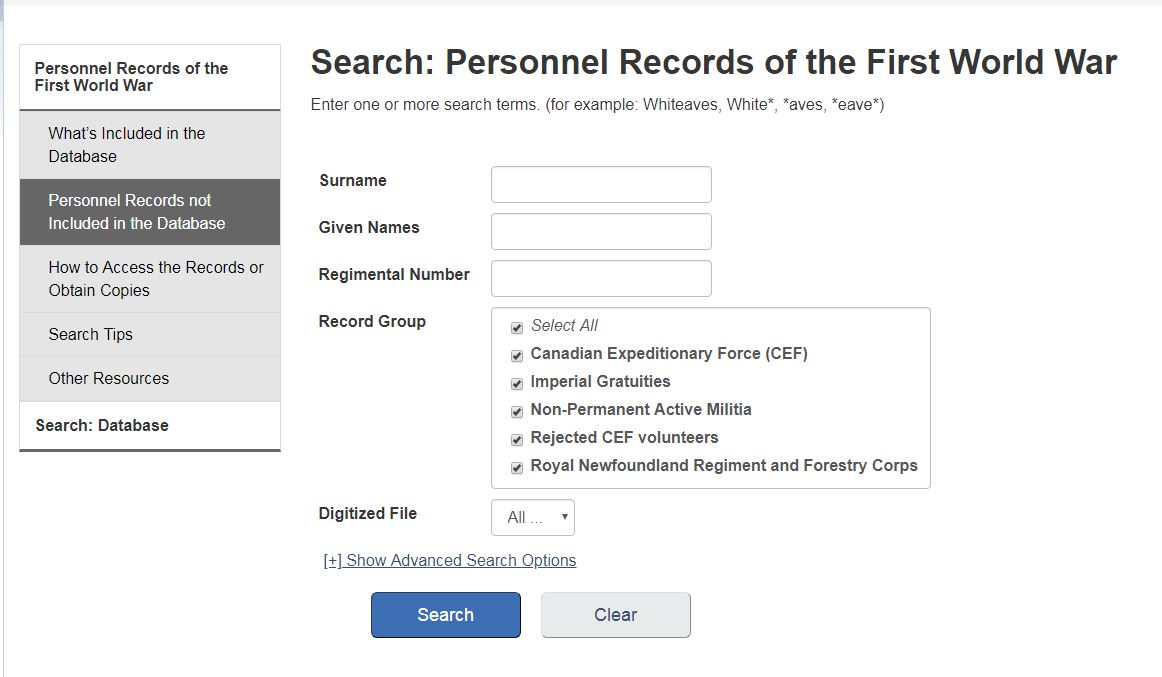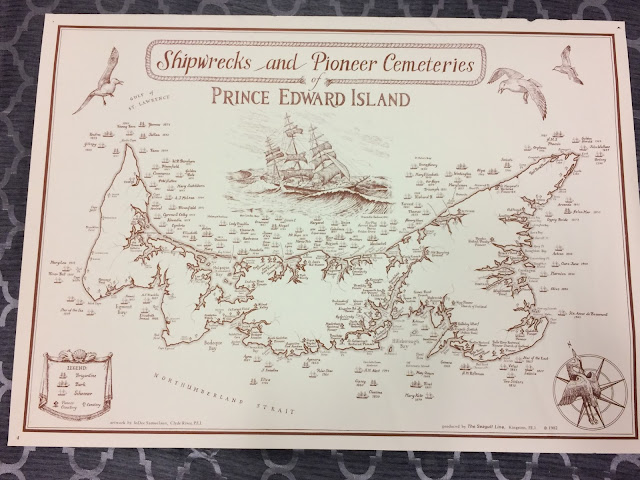Researching Veterans: How to Find Service Records
I had a lot of internal debate over what this post should be about. Should it be about a particular soldier or nurse? Focus on Island soldiers in a certain battle?
Islanders began enlisting for the First World War on July 28, 1914. In total, 7,168 Islanders (those living on PEI or who listed it as their birthplace) served in the war. During the war, 503 of these soldiers died and over 1,000 more were injured. These figures do not include those who served in the medical corps.
Many Islanders have family who served in the war and are curious about their experiences. But, the sad truth is that it is too late to ask them your questions now. Canada's last First World War Veteran, John Babcock, died in 2010 at the age of 109. He enlisted when he was 16! At one point, Canada considered giving him a state funeral when he died. But, he refused, claiming, due to his young age at enlistment, he wasn't sent into active combat and didn't deserve the honour.
So today, I am going to show you where you can find information on these Veterans. Whether it is your own family or a community member these men and women should not be forgotten. We may have records of them but those records should be kept alive and not left collecting dust, unused.
I am going to focus on First World War Veterans in this post for two reasons:
1. It is the 100th anniversary of the Armistice this year
2. All records for the men and women who served in the Great War are now available digitally through Library and Archives Canada (LAC). For the Second World War, only the files of those who died during the war or due to their injuries (war dead) are available and records from the Korean War are not available to the public yet. Part of this is because these records hold medical and other sensitive information. However, there are war diaries and letters available.
The best way to find records of a Veteran is through LAC. If you have never used the site, it can be confusing, but that is why I'm here. With genealogy being so big right now, LAC has put a lot of focus into their genealogy services.
So, for LAC -
Step 1.
Go to the LAC website
Step 2.
On the main information bar at the top, click "Search the Collection" and go to Military Heritage.
This will bring you to this page
You can see the links to the First and Second World War files on the right side. If you click on Second World War, you read, "There are no access restrictions on the service files for members of the Canadian Armed Forces who died in service between 1939 and 1947, including those killed in action, those who subsequently died of injuries related to service, and those who died as a result of accident or illness while in service." However, "For all other Second World War service files, access restrictions apply. The personal information contained in the service files is protected by the provisions of privacy legislation. For the same reason, the database and indexes that are used to identify the files cannot be made available on our website. Only staff may access them."
This means if a soldier or nurse died in the Second World War you can access the records, if they didn't, you can't.
If you select the First World War...
Step 3.
You will come to this page
On the left-hand side, you will see the menu, click "Personnel Records of the First World War." Then, click "Search: Database" on the next page, seen here
Step 4.
Enter search information. Seems simple right...
As anyone who has ever searched these records or researched their family history will tell you, it isn't always simple. For example, as Islanders, consider John MacDonald. Good Island name. Some things to consider:
How did he write his first name on the enlistment papers?
- John
- Johnny
- Jonny (how literate was he or the one writing down the information?)
- J.
- J. Middle initial
- John Middle initial
- Johnny Middle initial
- Only initials
Is John even his first name?
Some people go by their middle names in everyday life, then you see their licence or other official documents and discover that what you call them, isn't their first name. This means everyone may have called him John, but maybe his first name was really Alexander, which brings us back to how did he write his first name. You can see how this could get complicated?
How did he spell his last name?
- You go by Mac, but he might have gone by Mc - these got switched around a lot in Island genealogy. The idea that one is Scottish and one is Irish or one is Protestant and one is Catholic is a myth. For example, my grandfather went by McKenzie, we go by MacKenzie.
If you put the wrong one into the search, he will not appear in the results.
There are advanced search options available where you can enter things like date and place of birth, enlistment location, etc.
From there you can search for your family and click to see their Attestation Papers and record, which will include medical records, payment records, and either their date of death or when they returned home.
For those of you who have the means to visit a veteran's grave, the Canadian Virtual War Memorial can help you find the exact location of their grave. All you need is a name. The results include basic information about the soldier, the cemetery, and the exact location in the cemetery.
Finally, there is the Commonwealth War Graves Commission (CWGC). The CWGC honours all men and women of the Commonwealth who gave their lives in the First and Second World Wars. You can search directly from their home page. Just remember that because the CWGC honours the entire Commonwealth, to narrow down your search results. CWGC is also helpful if you are searching for someone who served with the British military or other Commonwealth country.
In 2018, it can be hard to grasp the sacrifices made by the men and women in the First and Second World Wars. We can ponder what these men and women went through but unless you can personalize it in some way, stats are just stats. So I encourage you to research your family history and talk to Veterans of all Canadian conflicts. We lose more and more of these men and women every year.
If you are interested in going to a Remembrance Day Ceremony this year, click here to go to The Guardian's website where they have a full list of all the ceremonies.
Also, because these blogs take a lot of time to research, write, edit, etc. I will be reducing new posts to once every two weeks. On weeks that I am not posting new content, I will either promote an older one that you may have missed or will promote an activity going on here in PEI.
Islanders began enlisting for the First World War on July 28, 1914. In total, 7,168 Islanders (those living on PEI or who listed it as their birthplace) served in the war. During the war, 503 of these soldiers died and over 1,000 more were injured. These figures do not include those who served in the medical corps.
Many Islanders have family who served in the war and are curious about their experiences. But, the sad truth is that it is too late to ask them your questions now. Canada's last First World War Veteran, John Babcock, died in 2010 at the age of 109. He enlisted when he was 16! At one point, Canada considered giving him a state funeral when he died. But, he refused, claiming, due to his young age at enlistment, he wasn't sent into active combat and didn't deserve the honour.
So today, I am going to show you where you can find information on these Veterans. Whether it is your own family or a community member these men and women should not be forgotten. We may have records of them but those records should be kept alive and not left collecting dust, unused.
I am going to focus on First World War Veterans in this post for two reasons:
1. It is the 100th anniversary of the Armistice this year
2. All records for the men and women who served in the Great War are now available digitally through Library and Archives Canada (LAC). For the Second World War, only the files of those who died during the war or due to their injuries (war dead) are available and records from the Korean War are not available to the public yet. Part of this is because these records hold medical and other sensitive information. However, there are war diaries and letters available.
The best way to find records of a Veteran is through LAC. If you have never used the site, it can be confusing, but that is why I'm here. With genealogy being so big right now, LAC has put a lot of focus into their genealogy services.
So, for LAC -
Step 1.
Go to the LAC website
Step 2.
On the main information bar at the top, click "Search the Collection" and go to Military Heritage.
This will bring you to this page
You can see the links to the First and Second World War files on the right side. If you click on Second World War, you read, "There are no access restrictions on the service files for members of the Canadian Armed Forces who died in service between 1939 and 1947, including those killed in action, those who subsequently died of injuries related to service, and those who died as a result of accident or illness while in service." However, "For all other Second World War service files, access restrictions apply. The personal information contained in the service files is protected by the provisions of privacy legislation. For the same reason, the database and indexes that are used to identify the files cannot be made available on our website. Only staff may access them."
This means if a soldier or nurse died in the Second World War you can access the records, if they didn't, you can't.
If you select the First World War...
Step 3.
You will come to this page
On the left-hand side, you will see the menu, click "Personnel Records of the First World War." Then, click "Search: Database" on the next page, seen here
Step 4.
Enter search information. Seems simple right...
As anyone who has ever searched these records or researched their family history will tell you, it isn't always simple. For example, as Islanders, consider John MacDonald. Good Island name. Some things to consider:
How did he write his first name on the enlistment papers?
- John
- Johnny
- Jonny (how literate was he or the one writing down the information?)
- J.
- J. Middle initial
- John Middle initial
- Johnny Middle initial
- Only initials
Is John even his first name?
Some people go by their middle names in everyday life, then you see their licence or other official documents and discover that what you call them, isn't their first name. This means everyone may have called him John, but maybe his first name was really Alexander, which brings us back to how did he write his first name. You can see how this could get complicated?
How did he spell his last name?
- You go by Mac, but he might have gone by Mc - these got switched around a lot in Island genealogy. The idea that one is Scottish and one is Irish or one is Protestant and one is Catholic is a myth. For example, my grandfather went by McKenzie, we go by MacKenzie.
If you put the wrong one into the search, he will not appear in the results.
There are advanced search options available where you can enter things like date and place of birth, enlistment location, etc.
From there you can search for your family and click to see their Attestation Papers and record, which will include medical records, payment records, and either their date of death or when they returned home.
For those of you who have the means to visit a veteran's grave, the Canadian Virtual War Memorial can help you find the exact location of their grave. All you need is a name. The results include basic information about the soldier, the cemetery, and the exact location in the cemetery.
Finally, there is the Commonwealth War Graves Commission (CWGC). The CWGC honours all men and women of the Commonwealth who gave their lives in the First and Second World Wars. You can search directly from their home page. Just remember that because the CWGC honours the entire Commonwealth, to narrow down your search results. CWGC is also helpful if you are searching for someone who served with the British military or other Commonwealth country.
In 2018, it can be hard to grasp the sacrifices made by the men and women in the First and Second World Wars. We can ponder what these men and women went through but unless you can personalize it in some way, stats are just stats. So I encourage you to research your family history and talk to Veterans of all Canadian conflicts. We lose more and more of these men and women every year.
If you are interested in going to a Remembrance Day Ceremony this year, click here to go to The Guardian's website where they have a full list of all the ceremonies.
Also, because these blogs take a lot of time to research, write, edit, etc. I will be reducing new posts to once every two weeks. On weeks that I am not posting new content, I will either promote an older one that you may have missed or will promote an activity going on here in PEI.






Comments
Post a Comment